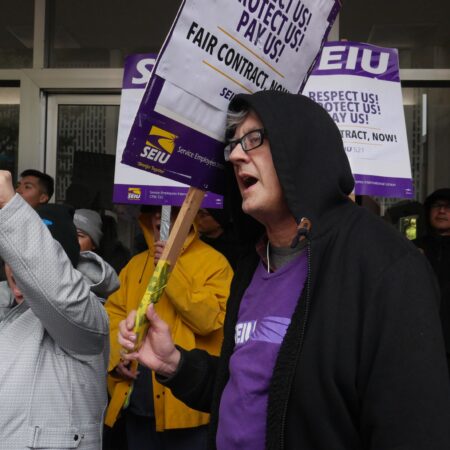Fight for $15
FOR IMMEDIATE RELEASE: April 15, 2015
CONTACT: Sam Shaw, sfshaw@gmail.com (661) 900-4818
National Press: Bartees Cox, bartees.cox@berlinrosen.com, (202) 815-6457
Emma Stieglitz, emmaS@berlinrosen.com 646-200-5307
Fight 4/15
On Tax Day, Fresno Workers Join Largest-Ever Mobilization of Underpaid
As Fast-Food Workers Strike in 236 Cities, Adjunct Professors, Home Care, Child Care, Airport, Industrial Laundry and Walmart Workers Come Together in Coast-to-Coast Protests
Fight for $15 Goes to College, With Students, #BlackLivesMatter Activists, Workers Joining Forces In Biggest Campus Protests Since Anti-Apartheid Movement
Global Movement Intensifies with Strikes in Italy and Protests in 100 Cities on Six Continents from Tokyo to Sao Paolo
FRESNO, Calif.- Workers, students and community members joined together Wednesday morning in Fresno and in cities from Pittsburgh to Pasadena, setting off a historic wave of protests for higher pay and the freedom to join unions that stretched across industries and around the globe and inspired college students and #BlackLivesMatter activists to join in.
The protests—the most widespread mobilization ever by U.S. workers seeking higher pay— came just days after Hillary Clinton announced she was running for president promising to confront America’s gaping inequality. The tax day strikes, marches and rallies included walkouts by fast-food workers in 236 U.S. cities, spanned industries from home care to academia, stretched from Tokyo to Sao Paolo- demonstrating the two-and-a-half-year-old Fight For $15 is stronger than ever.
Fast-food workers kicked off the protests by walking off their jobs at McDonald’s, Wendy’s Burger King, KFC, Dunkin’ Donuts and other major national restaurant chains. Around the country, workers went on strike for the first time in Albany, NY; Asheville, NC; Greenville, MS; Montgomery, Ala.; and San Jose, Calif. The strikes, which started a day earlier in Boston out of deference to the April 15 anniversary of the marathon bombing, came two weeks after McDonald’s announced it was increasing salaries for a fraction of its workforce by $1. But rather than mollifying employees, the paltry pay move inspired even more workers to join the walkout. All across the country, McDonald’s workers joined strike lines, chanting, “Hey McDonald’s Let’s Be Blunt, Your Raise is Just a PR Stunt.”
In Fresno, hundreds of students, community members and local home care, child care, state, county and farm workers staged a protest at a McDonald’s across the street from Manchester Mall. Led in prayer by Reverend B.T. Lewis, demonstrators peacefully chanted outside of McDonalds, calling for better wages for the most severely underpaid.
“I’ve worked in home care for a long time. I love my job, but I’m barely getting by. I can’t really plan for retirement because wages just aren’t sustainable,” said Vicky Vang, a Fresno home care worker. “That’s why I’m here today standing with my fellow home care workers and the Fresno community. We work hard to care for other people, but can’t even take care of our own. It’s time to lift the wage floor and fight for a better future for everyone.”
In New York City, striking workers and supporters protested at every McDonald’s in Manhattan, while in Berkeley, Calif. Robert Reich, a former secretary of labor, spoke to striking workers at a McDonald’s. Faith leaders and community supporters rolled out a red carpet as workers walked off their jobs at a McDonald’s in St. Louis.
More Than Fast Food
Inspired by cooks and cashiers from restaurants like McDonald’s and Burger King, adjunct professors, who are calling for $15,000 per course joined in the protests for the first time, along with home care, child care, airport, industrial laundry and Walmart workers.
“The movement that fast-food cooks and cashiers started has now grown into something much bigger—made up of adjunct professors, home care providers, retail employees, childcare workers, and airport staff—all fighting for a fair shot at a decent life.” said Mary Kay Henry, International President of the Service Employees International Union, which has helped support the Fight for $15. “Working people are going to keep speaking out in the streets, in their communities, and at the ballot box until we raise wages, strengthen the economy, and build a democracy that works for all families.”
Home care workers, who joined the Fight for $15 in a handful of cities last year, spread their protests to two-dozen cities Wednesday. In Atlanta, while fast-food workers went on strike, home care workers launched their own kind of walkout. Since they cannot strike in the same way as fast food workers and wouldn’t want to leave their clients without care, the Atlanta home care workers decided to #take15for15, embarking on 15-minute one and two-person protests outside their clients’ homes. In many cases, they were joined by their clients.
In New York City, thousands of home care workers wearing white lab coats marched from Columbus Circle to Times Square, boldly announcing their entry into the movement. Caregivers rallied in red states and blue ones, from Los Angeles to Raleigh.
Weeks after they joined the Fight for $15, child care workers in 10 states participated in the protests. Calling for a system that ensures quality, affordable and accessible child care for every American family, workers from California to Connecticut joined the call for $15 and a union.
Airport security guards, cleaners and ramp workers also protested across the country, calling attention to a crisis at America’s airports, where highly profitable airlines have cut wages, often by outsourcing their responsibilities to contractors. While airline fees and profits have soared and taxpayers invest billions to make airports hubs of prosperity, workers are living on the brink, struggling to survive.
For the first time, industrial laundry workers are joining the protests in Los Angeles, New York City, Newark, Philadelphia and Houston. Also for the first time, Walmart workers joined the Fight for $15 protests. Fresh off of forcing the company to raise pay for half a million workers, Walmart workers across the country hit the streets to show that they will not stop their fight until they get $15.
Fight for 15 Goes to College
The movement spread Wednesday to college campuses all over the country, where adjunct professors, who are calling for $15,000 per course, participated in their first Fight for $15 protests since joining the movement earlier this year. Even though many have PhD’s, adjuncts earn so little that 1 in 5 live below the poverty line and 1 in 4 are forced to rely on public assistance to scrape by.
Students from 200 universities joined their professors, waging the most widespread series of campus protests since the anti-apartheid movement. At the University of Illinois at Chicago, students, fast-food workers, and community supporters delivered a petition signed by thousands to the university’s chancellor, calling for a $15 minimum wage for all university workers. At the University of Southern California, students and faculty converged on the Tommy the Trojan statue and placed a Fight for $15 shirt on him. And at the University of Tennessee, Knoxville, students, fast-food workers, adjuncts and community supporters rallied and then briefly occupied a university food court.
At many of the campus protests, and in the streets throughout the day, calls for economic justice mixed with demands for racial justice as ties between the Fight for $15 and the #BlackLivesMatter continued to deepen. A report released Monday by the National Employment Law Project showed that more than half of black workers in the U.S. are paid less than $15 an hour.
In Charleston, near where Walter Scott was gunned down earlier this month, fast-food workers started their strike with a minute of silence and their backs turned to a McDonald’s restaurant. They chanted, “Backs Turned, Don’t Shoot,” and “Black Lives Matter.” And in Ferguson, MO #BlackLivesMatter activists and workers held a speak out outside the McDonald’s near where Mike Brown was shot and killed. In New York City, where Eric Garner was choked to death, students held a die-in in Columbus Circle to highlight the intersection of the two movements. And in Milwaukee, fast-food workers linked arms with members of the Coalition for Justice, a group organizing around #BlackLivesMatter, marching to where Dontre Hamilton was shot last year and listening to his brother, Nate Hamilton, talk about why the Fight for $15 and #BlackLivesMatter are one movement.
In addition to the coalition of groups organizing around #BlackLivesMatter, more than 2,000 partner groups, including the NAACP, the Moral Mondays movement, the Center for Popular Democracy, MoveOn.org, Credo and many others joined the protests.
#FastFoodGlobal
Workers in 123 cities, from 35 countries, on six continents representing some 50 global unions also protested as the movement around the world for higher pay and better rights expanded. For the first time, workers outside the U.S. coordinated strikes with workers here, with fast-food workers across Italy waging a national strike. Workers occupied a McDonald’s in Glasgow, stormed a McDonald’s restaurant in Sao Paolo and blockaded a McDonald’s in Paris, holding a six-meter long sign that read, “Stop Social Destruction and Tax Avoidance.”
“The fast-food industry is dominated by a handful of multi-billion-dollar global companies, so we need to have a strong, global movement of workers pushing for better wages, better treatment and better rights,” said Massimo Frattini, the international coordinator of the International Union of Food workers, which is coordinating the global protests. “By coming together across borders, fast-food workers have an opportunity to transform the industry all over the world.”
The global protests come as McDonald’s is coming under increased scrutiny for both its treatment of workers and its questionable corporate citizenship around the world. In Brazil, a coalition of trade unions has filed two lawsuits accusing the company of widespread and systematic labor and health and safety violations. One of the suits accuses McDonald’s of “social dumping,” an anti-competitive practice that drives standards down for workers across the country, and seeks to prevent the company from opening new stores unless it complies with Brazilian law. Also, McDonald’s agent in Latin America and the Caribbean, Arcos Dorados, has come under scrutiny in recent weeks, with an investor group asking the New York Stock Exchange to review the company’s corporate governance.
In Europe, McDonald’s is being accused by a coalition of trade unions and the UK-based NGO War on Want of avoiding more than €1 billion in taxes over the last five years. Last month, the European Commission’s Directorate of Competition launched a preliminary investigation to find out whether McDonald’s entered into an illegal deal with Luxembourg that allowed it to avoid taxes.
Meanwhile, in the United States, the federal government recently launched a case against McDonald’s, accusing the fast-food giant of rampant labor-law violations, and arguing that the corporate parent, and not just franchisees, are responsible for the illegal actions. This is all on top of suits alleging wage theft and racial discrimination in the US; more than two-dozen complaints filed with the Occupational Safety and Health Administration alleging McDonald’s workers are being burned on the job, with many told to use condiments like mustard to ease the pain; and the more than $1 billion in public assistance taxpayers spend to subsidize low wages here.
Tax Day
It isn’t just McDonald’s that is digging into taxpayers’ pockets. The tax day protests, held Wednesday both because the date, 4/15, is the workers’ demand and because they wanted to highlight the fact that they are paid so little that too many are forced to rely on public assistance to get by, came just days after researchers at the University of California-Berkeley released a report showing that persistent low wages are costing taxpayers nearly $153 billion every year in public support to working families.
In Connecticut, a proposal currently moving through the state legislature would fine large companies that pay low wages in an effort to recoup the cost these companies impose on taxpayers. Congressional Democrats’ Fiscal Year 2016 budget proposal unveiled last month included a provision that would roll back tax breaks for large companies that fail to raise pay on pace with inflation.
Changing How America Thinks About Wages
What seemed two years ago like a far-fetched goal—$15 an hour—is now not so crazy. In February, New York City Mayor Bill DeBlasio called for an increase in New York City’s minimum wage to $15 by 2019. In Chicago, the Chicago Teachers Union asked the Board of Education to pay $15 an hour to all workers in schools and in December, Chicago lawmakers voted to raise the minimum wage to $13. In Washington, workers won $15 in Seattle, where Bloomberg News said the city adopted “the rallying cry of fast-food workers,” and in SeaTac, where local low-wage airport workers played a leading role in winning a historic wage increase.
And in November, San Francisco became the third city in the U.S. to adopt a $15 minimum wage. Since the first fast-food strike in 2012, 9 million low-wage workers have gotten raises through local ballot measures, city and state legislation, contract negotiations and employer policy changes—more workers than are in private sector unions in the entire country.
Slate said the Fight for $15, “managed to completely rewire how the public and politicians think about wages;” MSNBC said it, “entirely changed the politics of the country;” and Fortune said it, “transformed labor organizing from a process often centered on nickel-and-dime negotiations with a single employer into a social justice movement that transcends industry and geographic boundaries.
The urgent need for solutions to America’s low-wage crisis is already emerging as a key issue in the run-up to the 2016 election. In The New York Times, David Leonhardt wrote, “[a]s the 2016 presidential campaign begins to stir, the central question will be how both parties respond to the great wage slowdown.” And Democrats and leading economic experts are increasingly looking to restore Americans’ rights to form unions as a way to bring balance back to the economy and create jobs that enable more communities to thrive.
###
Fast-food workers went on strike in the following cities:
Alameda, CA; Albany, NY; Amherst, NY; Asheville, NC; Atlanta, GA; Auburn Hills, MI; Aurora, CO; Austin, TX; Baton Rouge, LA; Bellevue, PA; Bellefontaine, MO; Berkeley, CA; Birmingham, AL; Black Mountain, NC; Bloomfield, CT; Boone, NC; Boston, MA; Brighton, NY; Brockton, MA; Brooklyn Center, MN; Brown Deer, WI; Brown Summit, NC; Buckhead, GA; Buffalo, NY; Burnsville, MN; Burton, MI; Candler, NC; Carmichael, CA; Castro Valley, CA; Centennial, CO; Chapel Hill, NC; Charleston, SC; Charlotte, NC; Cherryville, NC; Chelsea, MA; Chicago, IL; Citrus Heights, CA; Clairton, PA; Clarkston, GA; Claymont, DE; Clinton, MS; Colonie, NY; Commerce, CA; Compton, CA; Dearborn Heights, MI; Decatur, GA; Denver, CO; Detroit, MI; Dixon, IL; Dublin, CA; Duquesne, PA; Durham, NC; Eastpointe, MI; Edgewater, CO; El Cerrito, CA; Elk Grove, CA; Everett, MA; Fairfield, CA; Farmington Hills, MI; Federal Way, WA; Ferguson, MO; Ferndale, MI; Fitchburg, WI; Flint, MI; Flint Township, MI; Florissant, MO; Folsom, CA; Forsyth, MO; Fox Point, WI; Freeport, IL; Fremont, CA; Ft. Lauderdale, FL; Garner, NC; Germantown, WI; Gladstone, MO; Glendale, AZ; Glendale, WI; Grandview, MO; Greendale, WI; Greenfield, WI; Greensboro, NC; Greenville, MS; Greenville, NC; Gretna, LA; Hamtramck, MI; Harper Woods, MI; Hartford, CT; Harvey, LA; Hawthorne, CA; Hayward, CA; Henderson, NV; Henrico, VA; Henrietta, NY; Hercules, CA; Highland Park, MI; Homestead, PA; Houston, TX; Independence, MO; Indianapolis, IN; Inglewood, CA; Irondequoit, NY; Jackson, MS; Jacksonville, AR; James Island, SC; Jamestown, NC; Janesville, WI; Jefferson, LA; Jennings, MO; Kansas City, KS; Kansas City, MO; Kent, WA; Kirkwood, MO; Knoxville, TN; Lakewood, CO; Lansing, MI; Las Vegas, NV; Latham, NY; Laveen, AZ; Lawndale, CA; Lee’s Summit, MO; Lincoln Park, MI; Little Rock, AR; Littleton, CO; Livonia, MI; Los Angeles, CA; Lynn, MA; Madison, WI; Manchester, CT; Marietta, GA; Martin City, MO; Maryland Heights, MO; Melvindale, MI; Memphis, TN; Miami, FL; Milpitas, CA; Milwaukee, WI; Minneapolis, MN; Mission, KS; Montebello, CA; Mt. Oliver, PA; Nanuet, NY; Nashville, TN; New Castle, DE; New Orleans, LA; New York, NY; Newnan, GA; North Charleston, SC; North Highlands, CA; North Kansas City, MO; North Las Vegas, NV; North Little Rock, AR; Oak Park, MI; Oakland, CA; Olympia, WA; Opelika, AL; Orangevale, CA; Orchard Park, NY; Orlando, FL; Overland Park, KS; Pacoima, CA; Paradise Valley, AZ; Pasadena, CA; Penn Hills, PA; Pensacola, FL; Peoria, IL; Pewaukee, WI; Philadelphia, PA; Phoenix, AZ; Pine Bluff, AR; Pineville, NC; Pittsburgh, PA; Pleasanton, CA; Pontiac, MI; Providence, RI; Raleigh, NC; Rancho Cordova, CA; Randolph, MA; Raytown, MO; Redford Township, MI; Richmond, CA; Richmond, VA; River Rouge, MI; Rochester, NY; Rock Hill, MO; Rockford, IL; Roseville, CA; Sacramento, CA; San Diego, CA; San Jose, CA; San Leandro, CA; San Lorenzo, CA; San Pablo, CA; Sandy Spring, GA; Sanford, FL; Scottsdale, AZ; Seattle, WA; Sherwood, AR; South Boston, VA; South Gate, CA; Southfield, MI; Southaven, MS; Spanish Lake, MO; St. Louis, MO; St. Paul, MN; St. Petersburg, FL; Sterling, IL; Stone Mountain, GA; Stoughton, MA; Stoughton, WI; Sunnyvale, CA; Swissvale, PA; Tampa, FL; Taylor, CA; Taylor, MI; Tempe, AZ; Temple Terrace, FL; Troy, NC; Tucker, GA; Tucson, AZ; Union City, CA; University City, MO; Warren, MI; Warwick, RI; Waterford, MI; Wauwatosa, WI; Wayne, MI; West Allis, WI; West Milwaukee, WI; West Sacramento, CA; Westview, PA; Wilkinsburg, PA; Williamston, NC; Wilmington, DE.



